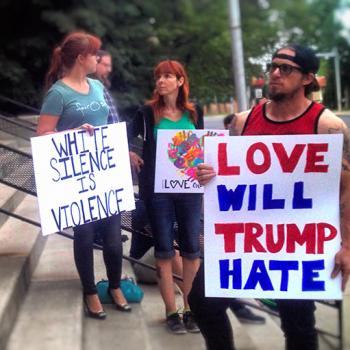Trayvon Martin, Renisha McBride, Jordan Davis, Michael Brown, Tamir Rice, Eric Garner.
Names that white America can safely ignore. Names that will be forgotten all too soon.
If you’re a white American, you don’t have to worry about the fact that black teenage boys are 21 times more likely to be shot and killed by police than white kids of the same age. You don’t have to pay attention to the fact that more than 10 percent of black men ages 20-39 will serve time in prison or jail during a given calendar year.
You can ignore those names and statistics as you go about your life. You can retreat to an insular and self-deluded reality defined by the narrative you’re most comfortable with: that “thugs” get what’s coming to them, that blacks are far more likely to commit crimes than whites or that race isn’t a relevant issue in these tragedies.
But, whether or not you or I or any other white American admits it, race is an issue, and through our actions and inactions we all are complicit in perpetuating racism in America. The truth is that I’m a racist and you probably are too.
Whether you realize it or not, you likely harbor positive associations with whiteness. You likely associate whiteness with education, happiness, well-being, safety and honesty.
Whether you realize it or not, you likely harbor negative associations with blackness. You likely associate blackness with crime, poverty, suspicion, danger and ignorance.
This isn’t just my subjective assessment: you can take a test to prove it. The Implicit Association Test (IAT) measures a person’s unconscious attitudes toward race (or, in variations of the test, toward myriad other social and cultural factors). The test only takes about ten minutes, but during that time, as you try to rapidly pair positive words with black faces and negative words with white faces, you may reach some eye-opening conclusions.
Find out for yourself: stop what you’re doing and take the test. (Though all the IATs are important, I recommend starting with the “Race IAT.”)
The results of my test show that I have a “moderate automatic preference for European American compared to African American.” In other words, I favor whites over blacks. I don’t feel like I do. I don’t want to have this bias. But I’ve taken the Race IAT several times over the last few years and the results have been disturbingly consistent.
Unfortunately I’m not alone. Of the tens of thousands of white people that have taken the test, almost 90 percent have an implicit pro-white or anti-black bias.
In his 2005 book Blink, Malcolm Gladwell discusses the IAT and its significance. He quotes Mahzarin Banaji, an IAT researcher at Harvard University, to explain why most Americans have an automatic preference for white over black:
You don’t choose to make positive associations with the dominant group, but you are required to. All around you, that group is being paired with good things. You open the newspaper and you turn on the television, and you can’t escape it.
And though we may be tempted to dismiss the pro-white results as a meaningless bit of psychological trivia, Gladwell cautions:
The IAT is more than just an abstract measure of attitudes. It’s also a powerful predictor of how we act in certain kinds of spontaneous situations. If you have a strongly pro-white pattern of associations, for example, there is evidence that that will affect the way you behave in the presence of a black person.
Our conscious and unconscious associations regarding race affect how we act. They affect what we say and what we do. They affect how we treat other people and in turn how we’re treated. They affect who is listened to and who is ignored, who is believed and who is doubted, who is passed by and who is stopped, who is given a second chance and, sometimes, who is killed.
Acknowledging this problem — owning up to our prejudices, our biases, our inherent and often unconscious racism — is only a tiny step toward addressing the deep racial issues that pervade American culture. But, while we continue to debate, deflect and deny, the list of names only gets longer:
Trayvon Martin, Renisha McBride, Jordan Davis, Michael Brown, Tamir Rice, Eric Garner, Wendell Allen, Orlando Barlow, Sean Bell, Rekia Boyd, Corey Brown, Jimmell Cannon, Kiwane Carrington, Amadou Diallo, Patrick Dorismond, Reginald Doucet, DeAunta Terrel Farrow, Jonathan Ferrell, Ramarley Graham, Oscar Grant, Akai Gurley, Kenneth Harding, Guy Jarreau Jr., Derrick Jones, Ronald Madison, Travares McGill, Vonderrit Meyers Jr., Aiyana Stanley, Victor Steen, Emmett Till, Steven Eugene Washington, Tarika Wilson, Ousmane Zongo …
 Dan Wilkinson
Dan Wilkinson
Dan is a writer, graphic designer and IT specialist. He lives in Montana, is married and has two cats. He blogs at CoolingTwilight.com.
















